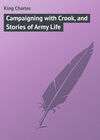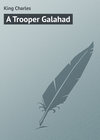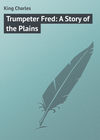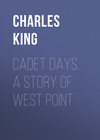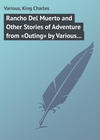Buch lesen: «From School to Battle-field: A Story of the War Days», Seite 9
CHAPTER XV
It was a starlit summer night following a day of moist, debilitating heat. It had rained at dawn, and then, as the clouds of heaven broke away and went sailing off towards the distant heights on the western horizon, the sun had poured hotly down on open fields and sodden red roads and long rows of wet, white tentage, veiling the landscape with miniature clouds from the teeming earth. All day long soldiers innumerable lolled about the camps and thronged the sentry-posts that lined the roadway, chaffing the passers-by or dickering with darky vendors of fruit, cakes, and pies, – amateur soldiers were these, as any veteran could tell at a glance, some in gayly trimmed regimentals, some in antiquated tail-coats, more in fancy jackets, few in serviceable garb, and nearly all with their hands in their pockets. A bored, jaded, time-killing lot they looked. The ground was too wet and muddy for drill. The first flush of patriotic fervor had worn away. They had rushed to the front at the earliest call, expectant of tremendous doings, and, except the street-fight of the Sixth Massachusetts in Baltimore and a few shots heard at the picket-posts, there had been no taste of battle. They were the three-months men, mainly State militia, hurried down to hold Washington against attack, while the volunteers, the "three-years men" of the war, were organizing and drilling behind them. Their three months had nearly expired, and most of them were eager to go home so long as there was nothing going on at the front. Some, indeed, were ready to go anyhow, many with the promise of commissions in the volunteers, many with the resolve to re-enlist for the war, but all anxious to visit home and friends and families and get a more deliberate start than that initial impulse which sent them forward the latter part of April, burdened with knapsacks they knew not how to pack or wear and guns that they had never shot.
And here, along the main pike to Fairfax and Centreville, one on each side of the way, a New York and a New England regiment of militia had been swapping comments and criticisms most of the afternoon, badgering each other when there came no one else to bear the brunt of their shafts, and mischievously turning with one accord on passers-by whose lack of rank or escort suggested improbability of effective resentment.
But as the day wore on and the mud thickened in the middle of the road, and staff-officers, orderlies, and ambulances passing by began to veer out to right and left and encroach on the sentry-posts and the grinning groups that lay just back of them, "the boys" waxed more savage and sarcastic. They had occupied those camps full six weeks, and thought they owned the neighborhood. Back towards Washington, on every rising ground, the red embankments showed where earthworks had been thrown up to defend the front. Along the beautifully wooded slopes to the north and west the fair contours were scarred and defaced with freshly spaded parapets, and through gaping embrasures here and there frowned the black muzzles of the Union guns. Over a rounded knoll half a mile to the northwest of the camp of the New-Yorkers the stars and stripes hung lazily from a white staff, and there were the quarters of a division commander, whose aides and orderlies had been oddly busy all day long, responding, according to rank, with a frown of annoyance or a grin of amusement, to the hail of comment or question from the loungers along the line. But at four in the afternoon a whole squadron of regular cavalry, with high-collared, yellow-trimmed jackets and jaunty forage-caps, came silently squashing by, taking the mud and the middle of the road as a matter of course, and the chaff and comment as of no consequence whatever. Hardly had their flapping silken guidons disappeared around a bend of the pike three hundred yards farther to the west than there came jogging into view from the rear a long column of horses, gun-carriages, and caissons, the cannoneers sitting motionless on the chests, the drivers carefully guiding their powerful teams. A wiry captain, followed by his bugler, came trotting forward, surveyed the mud that interposed along the defile between the two camps, nodded cheerily to the "Going out ahead, Cap?" sung out to him by the nearest New-Yorkers, and signalled with gauntleted hand to the leading chief of section to incline to the right and take the turf at the roadside; and so they, too, went clinking steadily by, twelve long teams of six horses each, hauling six bronze "Napoleon" guns, heavy fellows, and six loaded caissons. Behind them came their forge and battery wagon, a mule-drawn baggage-wagon or two, and one of the famous light batteries of the regular army had passed through the thronging lines of the State militia, who emptied their tents to see the procession and to hurl question after question as to the meaning of it all. And this was only a beginning, for right behind it came the flaunting red silk guidon of another battery, differing from the first only in that the men wore red-trimmed jackets instead of dark-blue blouses, and that the cannoneers were skipping along the roadside or squashing through the mud, their captain holding sternly, even on a short march, to one of the rules of the light artillery, that the horses should have to pull as little weight as possible. And no sooner was he fairly by and his men well within the lane of the militia camps than the storm of fun and chaff rose to uproar, silenced only when the tail of the column had passed beyond. By this time, too, the officers were coming out to take a look. Then there rose a burst of martial music and a sound of cheering up the roadway, and, preceded by a band, there rode into sight some mounted officers, behind whom gleamed the sloping barrels of the arms of a battalion of infantry; and now New York and New England dropped cards, checkers, or chat, and the last laggards of both regiments come streaming to line the roadway and scan these bold invaders. Even the colonels mount their horses and ride in among their men, and as the music ceases and the regiment picks its way gingerly through the mud, the cry goes up from the eastward skirts of camp, "The Fire Zouaves!" and that cry is taken up and passed from lip to lip, and order and discipline, even of these primitive war days, all are forgotten, and as the long column comes winding down the gentle slope in the afternoon sunshine, and bright bits of scarlet glow through the sombre tone of gray, and the old familiar fire shirts are recognized, as one man the New-Yorkers set up the welcoming fireman chorus of the streets of Gotham, and the welkin rings with shouts of "Hi, hi, hi!" mingled with rapturous cheers. Prompt comes the answer from a thousand lusty throats. Caps and hats are tossed in air, ay, and, as the column and the colors mingle, canteens, tossed from bystanders to marchers, are pressed to thirsty lips and passed from hand to hand. Officers and men alike, militia and volunteers, the soldiers of Manhattan are shouting greeting and rejoicing, and the next moment, despite all efforts of the senior officers to stop it, the Zouaves are forcibly seized and dragged from the marching ranks, hugged and hauled and slapped on arm and chest and leg and shoulder, wherever knapsack, blanket, and cartridge-box do not interpose below the neck, and men come running with more canteens, and Zouaves are lugged bodily away to the neighboring sutler's tent, and when, finally, the last unmolested files of the Fire Zouaves have gone, cap-waving and cheering, on in the trail of the batteries, the camp of their fellow-townsmen is filled with stragglers who are only recovered an hour later through the medium of strong patrols.
But meantime the batteries have "gone into park," unhitched and unharnessed back of the Virginia farm-house just beyond the bend. The Zouaves have trailed off into an open field between them and the tents of the New-Yorkers. Staff-officers have conducted the commanders to the designated spots for their bivouac. Two other regiments of the new volunteers have followed, marching somewhat wearily past the now thoroughly roused camps of the militia, and as the sun sinks to the west and heavy knapsacks are unslung and arms stacked in the fields and sentry-posts established, everybody begins to realize among the tents of the earlier comers that a move to the front is in contemplation, just when they were counting on a homeward move to the rear.
And now as the tattoo drums are bracing up, a score of officers are gathered about the tents of the New York colonel, chatting over the probabilities. With them are two of the New England officers, one a grave, taciturn captain who has listened for half an hour without a word. By several officers the idea has been advanced that if a forward move is intended in response to the "on to Richmond" cry of the press, many of the men will demur. They were called into service in mid-April; it is now mid-July. Many of them are clerks who will lose their positions, married men who have made no provision for their families, staid citizens who from sense of duty sprang to the front at the first summons, so as to help hold the fort until the nation could organize its army of volunteers. Of regulars at the time there were less than ten thousand, scattered from Maine to Oregon, from Mackinaw to the Gulf of Mexico. Now the first levies of the volunteers were pouring in. Here already in front of Washington were regiments from New York, New Jersey, Michigan, Ohio, even far away Wisconsin. Why should the government require of the State militia, rallied at the capital solely to defend, that it should march away southward to attack an enemy in position? Similar views were being expressed in other militia camps, said the speaker, and the colonel looked worried.
At last he turned to the stalwart, silent captain from the regiment over the way.
"What do your people say, Captain Stark?" he asks.
"Nothing," is the answer, as the tall, bearded man puffs meditatively at the brier-root pipe, his head resting on his hand, his elbow on his knee.
"Well, you were mustered in about the same date we were. Don't some of your boys talk of going home, and wanting to?"
"Not – audibly," says Stark.
"Well, they must be thinking a lot. They are fixed pretty much as ours are," hazards a field-officer.
"Possibly," says Stark, tapping out the ashes on the leg of the camp-stool. "But we made no stipulation as to the duty to be required of us. We tendered our services and expect to take our chances."
"Do you mean your boys would all go, no matter how far south they were ordered?" asks a young officer who has already had much to say about his own.
"My men will go wherever they're ordered," answers Stark, briefly. "I haven't any boys, except one, and he's so much of a man I never found him out till we got here."
"That brown-eyed young fellow I've seen round your tent?" queries the colonel, deeming it wise to change the tenor of the talk.
"The very one."
"How'd you come to take him? He's too light built for heavy work. He's outgrown his strength and he don't look eighteen," says the major, glad enough to shift implied criticism to the rival regiment.
"Well, his employers said he was worth three men around the shop, and he was bound to go. The inspectors passed him, and there he was in my company."
"Looks all legs," hazards the colonel.
"And is all head," says Stark. "That's why he's always studying tactics and regulations round my tent instead of fooling away time with the company. There goes tattoo. Good-night, gentlemen," and the New-Englander rises and presently strides away.
Over within the lines of his own regiment Stark passes line after line of company streets where the men are skylarking or chatting, waiting for the "fall in" signal at the close of the sounding of tattoo. The drums and fifes are hammering noisily down along the color line as he reaches his own company and his first sergeant comes forward and, saluting, says, "Did young Lawton find you, sir?"
"No. What did he want?"
"Permission to go out of camp, sir. Said he knew an officer in the Fire Zouaves. The lieutenant signed a pass, and he took it to the colonel, but he wished the captain should know."
"Very well. Form your company," says the captain.
The long wailing notes of the tattoo and the roll of the drums came abruptly to an end. The silent, shadowy double rank stood to attention, and, lantern in hand, the sergeant called his roll. Two names met with no response besides those of men on guard. Two men were reported absent. One of them came on the run as the company broke ranks.
"I was with Lawton, sir," said he, to his soldierly commander. "They let us into the Zouave camp all right, but didn't want to let us out. Lawton couldn't get away at all. As many as twenty of those red-shirted fellows nabbed him, and there he is a prisoner."
"In fun, I suppose?"
"Why, yes. They seem to know him well and be mighty glad to see him. I told my brother, who is in one of their companies, that Lawton must come home with me or he'd get into trouble, but the crowd just laughed."
"Very well. Go to your tent," said Stark, and went to his own. There on the little camp-desk was a note which he tore open and read. Briefly it said that Lawton had recognized some old friends among the Fire Zouaves, and had sought the captain to get permission to go and see them early in the evening. Even though the lieutenant took the responsibility and signed the pass, and the colonel too, he wanted his captain to know whither he had gone and that he would be back at tattoo.
But he wasn't back at tattoo, nor at taps. Not until eleven o'clock did Stark hear the sound of the young soldier's voice. Lawton was scratching at the tent-flap.
"What is it?" shouted the captain.
"It's Lawton, sir, – come to report return. I was held by those men, quite a lot of them, and simply couldn't make them understand about our discipline."
"Never mind," interposed Stark. "Go to bed now and get all the sleep you can. You may need it;" and the captain rolled over on his cot, anxious to try his own prescription.
But the late comer hesitated. For a moment he stood irresolute. Plainly there was something which he wanted to say to his commander. The officer of the day, lantern in hand, came along at the moment, his red sash crossed upon his broad chest. He raised the lantern and peered at the tall young soldier, whose coat and trousers looked as though they had been made for a shorter lad, and the face that was revealed seemed white and full of trouble.
"I was just speaking to my captain, sir," explained the young soldier, and the officer of the day went briskly one way, the soldier, dejectedly, another.
"Homesick, and wants to go and see his mother," said the officer of the day to himself. "Well, he needn't waste time pleading with Stark. Might as well talk to a stone."
CHAPTER XVI
"On to Richmond," said the Northern papers. "Sweep the flag of rebellion to the Gulf!" And obedient to popular clamor, and in defiance of common sense, the Government ordered its little army – a handful of regulars and marines, three dozen regiments of State militia, or of half-drilled, unseasoned volunteers – to advance and attack an army of equal size, made up of enthusiastic Southerners as undrilled as the Northern volunteers, but the flower of their manhood, defending their own soil, in their chosen position. The July sun beat hotly down on the long column, plodding south-westward through Fairfax. Many a poor fellow fell by the wayside, unable to keep up the pace and carry his heavy burden. Many a regiment broke ranks at sight of a farm well or at mention of a spring, and scores of stragglers stopped to pick blackberries by the way, defiant of the pleadings of their officers. Some Pennsylvania militiamen, at the last moment, refused to go farther than Centreville, and, with a New York militia battery, demanded their discharge on the plea that their time had expired. Some others succeeded in persuading the authorities in individual cases, and, to the scandal of those who tried and did not succeed, turned back to Washington. Those jaunty red jackets of the drum-boys in Shorty's old regiment looked worn and tawdry by this time, and the youngster whose wrists protruded far beyond the limit of the sleeves designed for the "little un" had more than once wished the original occupant back in his old place and his successor out of it. But that drum corps had seen the last of their smallest member, and he of them, for many a day. Billy Archer, he who was to tell Shorty when he came where to find Snipe, had been sent home sick at the end of the first month, and only seven of the biggest and strongest remained to beat the old "six-eights" and "two-fours" when the regiment marched for Manassas. There had come a letter from Shorty to Billy Archer with an enclosure to Snipe, but Snipe and his regiment disappeared the night before, and Archer didn't know enough to have it forwarded. He thought they would meet again within a day or two, when, in point of fact, they did not meet at all. Shorty's old regiment was assigned to a brigade on the north side of the Potomac, and Snipe's new-comers were marched over the Long Bridge to the sacred soil of Virginia and brigaded with troops from three different States, and there, as the grave, big Captain Stark had said, the representative of the First Latin spent hours at his commander's tent, studying tactics and regulations and a little book called "Mahan's Outposts," when Stark wasn't using them, and twice it had happened that when the New England regiment was called upon to furnish the details for grand guard and picket, the tall, slender, brown-eyed boy in Company "C" was able to tell corporals and sergeants things about their duties they never had dreamed of. So, too, on battalion drill, Snipe, who used to hate such things, and even now bent under the weight of his long musket, had a more intelligent idea of the purpose of each formation and movement than most of the file-closers, some lieutenants not excepted. Before they had been a month in Virginia Captain Stark had taken a strong fancy to the youngster, and was seriously thinking of decorating his arms with chevrons when the order for the advance and Stark's promotion came together. The lieutenant-colonel, finding that his health could not stand the climate and exposure, had resigned and gone home, and just the very morning after the incident described in the last chapter a batch of new commissions reached the New-Englanders. Stark became major, vice Proctor, promoted lieutenant-colonel, and turned his company over to its new captain, the former first lieutenant. Stark's first act, after taking the oath and signing his acceptance, was to send for Lawton. The regiment, with much glee and excitement, was packing knapsacks for the move, and the lad came, pale and troubled.
"Are you ill, Lawton?" demanded Major Stark.
"No, sir. I just – got some bad news."
"Folks ill?"
"No, sir; it's something a sergeant in the Fire Zouaves told me."
"You don't wish to go home, do you?"
"I do, sir; but I won't. I'm going with the company."
"Lawton," said the major, after a moment's scrutiny of the lad's solemn face, "you've never told me where you live and I've never asked. I believed in you, and that's enough. The colonel has given me permission to choose my orderly from my old company. I have bought Colonel Poague's horses. The orderly will ride my spare horse and look after both. I want you, if you care to take the place."
"Yes, sir; I do."
"It leaves you out of the race for vacancies among the corporals."
"No matter, sir. That'll come when we reorganize for three years."
And so Snipe turned his long musket and heavy cartridge-box over to the first sergeant, dumped his knapsack and blanket into the field-officer's wagon, and straddled the major's spare horse. At any other time he might have felt the sense of exaltation that is inevitable to the boy or man who knows how to ride, but the young soldier's spirits were dashed and drooping. There was no time for brooding, however. The New-Englanders were on the march for Manassas. The dusty roads were thronged with troops, trudging buoyantly ahead, confident in the strength of their numbers and counting upon a conqueror's entrance into Richmond within ten days. Somewhere about noon, midway between Fairfax and Centreville, the "route march" was suddenly changed to silence and to cadence step. A staff-officer had accosted the colonel. The commands "halt" and "front" brought them into line facing the left; then the regiment was dressed back to the right until it stood aligned at the roadside, and Snipe found himself seated in saddle just to the left rear of his major, who had reined up at the left of the line. Looking back along the dust-covered route, the lad could see that the regiments following them in column were also halting and "fronting," as soon as closed to proper distance, and then, with ordered arms, standing at ease and wondering what was coming. Presently, far back towards Fairfax, there uprose a cheer that was taken up along the line, and Lawton and his major, craning their necks, could see a body of horsemen coming through the slowly settling dust-clouds, following the lead of a soldierly-looking man on a big gray. A band struck up "Hail Columbia;" the regiment directly to their left began to take up the shout of acclaim, beginning away down at the tenth company, and the handsome horseman raised his forage-cap and spurred rapidly on. Again he raised it as he passed the colors, and the shout of greeting rolled into the right wing; and now the New England lads could see the yellow sash and the gold-embroidered belt, and knew a general officer was coming, and they, too, prepared to relieve their dusty lungs and overflowing spirits with a cheer. But all on a sudden the old colonel's shrill voice was heard, "Attentio-o-on battalion!" and talk and laughter ceased. "Shoulder-r-r homps!" and every musket jumped from the ground. "Prese-e-e-nt homps!" and nine hundred glistening barrels bounced out in front of nine hundred martial noses. The silken colors, State and National, drooped forward in homage to the coming dignitary. The major sat bolt upright and looking straight over his horse's ears, his sword lowered to the salute, and Snipe's hand went up to the visor of his grimy cap, and the major-general smiled affably as he came trotting by, his horse shying sidewise with eyes and ears attent, and the grizzled colonel got a word of soldierly praise from the cap-tipping commander as he sped swiftly on, the staff trying hard to look dignified and keep their seats and distance at the same time, which several of them, being new to the business, found it hard to do. Behind them jogged a troop of regular cavalry, – the general's escort, – veterans who had spent years in saddle and showed it; and then with gratified pride that he and his regiment had given proper and soldierly recognition to the chief, "instead of yelling like a town-meeting," said the colonel, that veteran of the Mexican war days permitted his men once more to "order" and rest and await developments. They were not long in coming. Away down to the left, over the shouts and greetings of other commands, could be heard the characteristic "Hi! hi! hi!" of the Fire Zouaves, and presently in long column of pieces, cannoneers mounted, two business-like batteries of the regulars came clinking along, their powerful, mettlesome horses moving like so much perfect machinery at steady walk, their drivers responding to the chaff and cheers and comments of the militia and volunteers by occasional droll wink or thrust of tongue into the nearest cheek, their nimble gun detachments grinning exuberantly, but rarely uttering a word. And then at last, when even their baggage-wagons had trundled by, a band was heard along the thoroughfare behind them, and through the dust came stalking a superb drum-major, his baton swinging in one hand, his huge bear-skin shako dangling from the other arm; and then the halted column coughed and sneezed as a strong regiment of infantry marched silently by in column of fours, determined, evidently, to impress upon the rest of the division their martial appearance and discipline. And then, in vivid contrast, right behind them, came the loose gray jackets and trousers, the red shirts and faces of the Fire Zouaves, grinning, chaffing, "hi, hiing" every foot of the way, and Major Stark turned and signalled to his orderly, and the lad rode up alongside.
"These are your old friends, I take it, Lawton. Sit here where you can see them."
The colors went sweeping by, flaunting in the sunshine despite the besmirching dust, and the seventh company came swinging along, and all of a sudden a wiry-looking sergeant file-closer glanced up and shouted, "Hullo, Snipey! How are you?" after the Bowery fashion of the day. "Hullo, Snipey!" came the greeting from half a dozen brawny throats. "Say, sonny, did you git square with that Metamora gang before you come away?" "Hullo, Snipe! Where's Shorty all dis time?" "Say, boy, what deestrick d'you run to now?" And before anybody could say a word to prevent it, half a dozen laughing, rollicking fellows sprang from the ranks and were crowding about Lawton as he sat blushing, half pleased, half ashamed, and shaking the lad by the hand. "Come over and see us when we git to camp," they cried in chorus, as, clamping their heavy sword-bayonets to their sides with the left hand, and trailing the brown barrels of their "special" rifles, they hurried on to catch their company. It was all over in a minute, but the New-Englanders looked curiously at the major's orderly, and that quiet-mannered, taciturn officer finally turned, with something like a smile.
"One would hardly say those fellows could have brought you ill news, Lawton. They seem like old friends."
"I knew them well when at school in New York, sir."
"Who is Shorty?"
"He was my chum, sir. I thought he'd be here long ago. He was a drummer in the Seventy-first New York. His relatives wouldn't let him come, I suppose."
"Would yours, do you think, – if they knew?"
"No, sir. But my father's been dead a long time. My mother married again, and – I've been shifting for myself of late."
"I understand," said the major, inclining his head; "but does your mother know now?"
"I write to her every month, sir. She knows I'm with the army. They would get me out if they knew where to find me, but I should enlist in another regiment under another name, so what would be the use?"
And then once more came the command attention. Again the dusty march was resumed. Again the column alternately tramped and halted. Other generals and staff-officers rode to and fro, and were curiously inspected by the rank and file. Again the New-Englanders were led off into an open field some distance from the pike, and, late in the afternoon, stacked arms and unslung knapsacks in a skirt of woods. Pots, kettles, and canteens were filled from the cisterns and wells of the neighboring farm-house, whose inmates looked on in silent disapproval, and just as the sun was sinking toward a distant line of heights some twenty miles away to the west, that a school-master in the color company said were called the Bull Run Mountains, somebody held up a warning hand and said "Listen!" There was a throb and pulsation in the heavy, heated, breathless air. A dull booming sound at irregular intervals came floating from the distant front. Men sprang to their feet from under the trees and listened eagerly, their faces paling a little; some lips uncontrollably twitching. It was the first note of the grand overture so soon to burst in the magnificence of its volume on their unaccustomed ears. Somewhere out toward that winding fringe of timber in the low ground five miles away to the south a field battery had sighted the enemy in sufficient force to warrant unlimbering and letting drive. The hostile armies were within striking distance.
For a moment the men from the land of the Puritan listened in awed silence. There had been a sharp encounter down that way two days before between the leading division and a concealed enemy, and rumor had it that many were killed and wounded, but the ambulances had been sent another way, and this brigade saw none of them. Over toward the roofs of Centreville a Western regiment sent up a cheer. Somewhere through the woods, down toward the right, the uproarious "Hi, hi" of the Zouaves, like the yelp of a pack of prairie wolves, rose swift from wing to wing, and in the midst of the distant clamor the major's quiet voice fell on Snipe's listening ears, and the lad started, gulped down some strange feeling as of faintness and nausea that had stolen over him, and pulled himself together.
"The horses? Yes, sir, they'll be through feeding in ten minutes."
"Very well. I'm to go forward with four companies at dusk. You needn't, if you wish to write – or anything."
But when the major led that silent detachment into the winding bridle-path through the trees, following the lead of a young staff-officer who rode jauntily ahead, Snipe Lawton followed close at his commander's heels.











